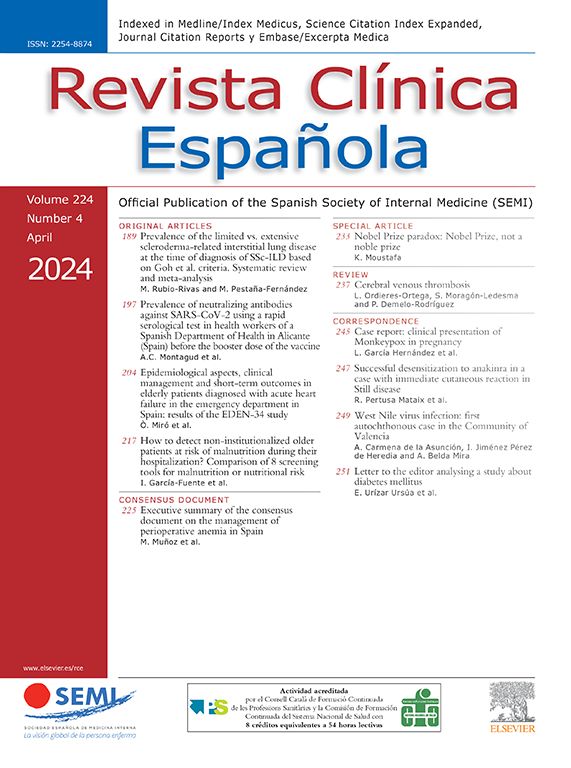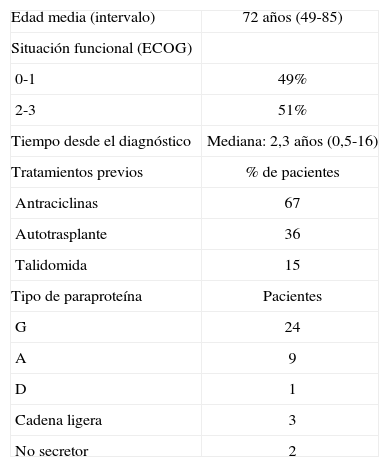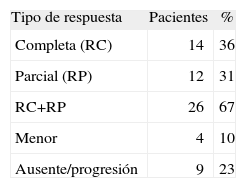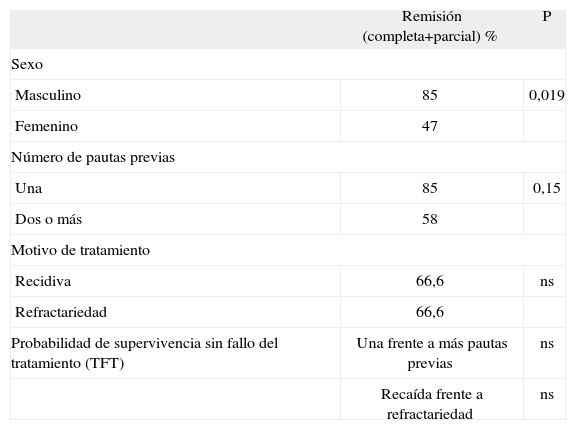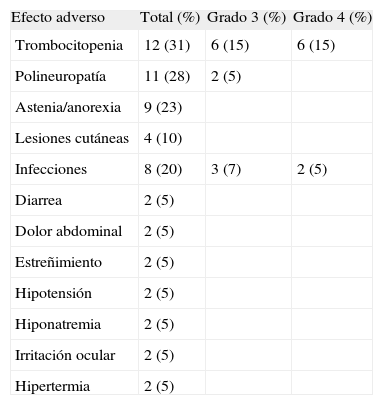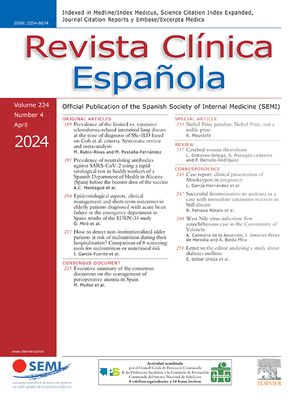Bortezomib se ha incorporado como tratamiento de rescate en el mieloma múltiple (MM) por la eficacia y perfil de seguridad observados en estudios multicéntricos. Pretendemos verificar ambos aspectos en un entorno de pacientes no seleccionados.
Pacientes y métodosEstudio observacional prospectivo de los pacientes con MM en recaída o refractarios tratados con bortezomib en nuestro Servicio. Variables analizadas: respuesta, duración, tiempo hasta el fallo del tratamiento (TFT), supervivencia global (SVG) y variables relacionadas con la respuesta y toxicidad. Métodos estadísticos: prueba exacta de Fisher, log rank-test y tablas de supervivencia de Kaplan-Meier.
ResultadosIniciaron el tratamiento 39 pacientes, refractarios a quimioterapia (14) o en recidiva (25), con una media de 2,3 líneas de tratamiento previas, administrándose un promedio de 5,8 ciclos de bortezomib. Alcanzan respuesta completa (RC) 14 pacientes (36%), parcial (RP) 12 (31%), y menor o nula 13 (33%). La duración mediana de la respuesta fue de 8 meses, de TFT 10 meses, y de SVG desde el inicio de bortezomib 16,5 meses, con una mediana de observación de los pacientes vivos de 12,6 meses. La respuesta fue más frecuente en varones (p=0,019) y en pacientes con sólo una pauta previa de tratamiento (p=0,15), sin variaciones significativas en TFT al considerar motivo de su instauración (recidiva o refractariedad) o número de pautas previas. Efectos adversos más frecuentes: trombocitopenia reversible (31%), polineuropatía (28%) y astenia-anorexia (23%).
ConclusionesEn nuestra serie de pacientes no seleccionados con MM recurrente o refractario se ratifican las observaciones de estudios multicéntricos con bortezomib en la frecuencia, duración de la respuesta, TFT, SVG y perfil de efectos secundarios.
Bortezomib has presently become a significant rescue treatment in multiple myeloma (MM) due to its observed effectiveness and safety in multicenter trials. We have aimed to verify both aspects in a setting of non-selected patients.
Patients and methodsThis is an observational, prospective study of the cohort of relapsed or refractory MM patients treated with bortezomib in our Department. The variables analyzed were response, its duration, time to the treatment failure (TTF), overall survival (OS), response related conditions and toxicity. Statistical methods used were Fisher’s exact test, log rank-test and Kaplan-Meier survival tables.
ResultsA total of 39 patients, 25 relapsed and 14 refractory to chemotherapy, started the treatment. The mean number of previous treatment was 2.3 and they received an average of 5.8 cycles of bortezomib. Complete response was achieved in 14 patients (36%), partial response in 12 (31%) and minor or no response in 13 ones (33%). Median duration of response was 8 months, median TTF was 10 months and median OS, from the onset of bortezomib was 16.5 months, with a median observation of live patients of 12.5 months. The response was more frequent in males (p=0.019) and in patients with one previous treatment (p=0.15). There were no significant differences regarding to TTF when we considered the cause of treatment (relapse or no response to chemotherapy) nor in the number of previous treatment regimes. The most frequent adverse events were reversible thrombocytopenia (31%), polyneuropathy (28%) and asthenia-anorexia (23%).
ConclusionsIn our cohort of non-selected, relapsed or refractory MM patients, the observations found in the multicenter randomized trials results regarding response rate and duration, TTF OS and safety of bortezomib therapy were verified.
Article
Diríjase desde aquí a la web de la >>>FESEMI<<< e inicie sesión mediante el formulario que se encuentra en la barra superior, pulsando sobre el candado.

Una vez autentificado, en la misma web de FESEMI, en el menú superior, elija la opción deseada.

>>>FESEMI<<<

